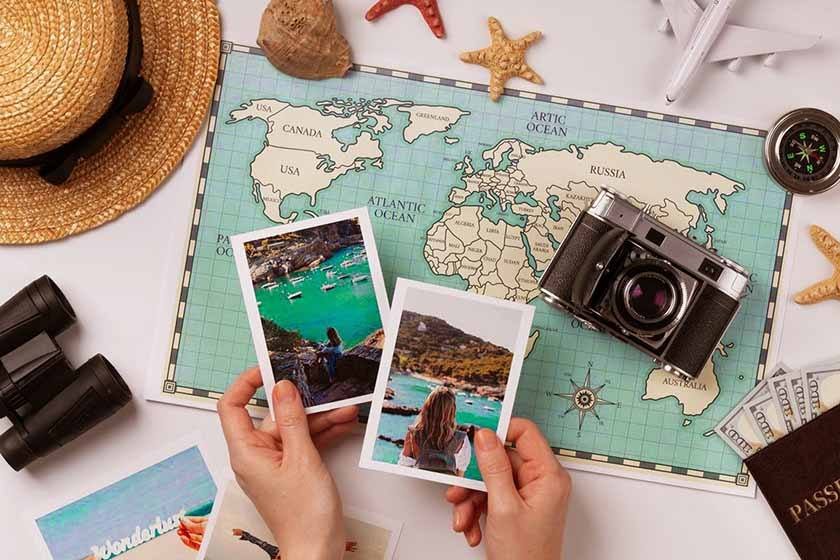Traveling across Europe can be an incredible experience, and it doesn’t have to break the bank.
With the right planning, the best way to travel Europe allows you to explore the continent’s rich history, stunning landscapes, and vibrant cultures without overspending.
You will discover practical tips for setting a realistic budget, navigating transportation, choosing affordable accommodations, and finding delicious yet inexpensive dining options.
Prepare to make the most of your European adventure while keeping your wallet happy.
How to Plan Your Budget for Traveling in Europe
Planning your budget for traveling in Europe is essential to ensure a memorable experience while avoiding overspending. It is important to consider various factors such as currency exchange rates, accommodation options, and local customs when creating a comprehensive travel itinerary.
By understanding your needs and the costs associated with travel in Europe, you can identify budget-friendly destinations and utilize travel hacks that enhance your experiences without compromising quality. With the right planning and resources, you can explore local cuisines, historic sites, and cultural experiences while staying within your financial limits.
1. Set a Realistic Budget
To kickstart your journey, it is essential to establish a realistic budget that encompasses all aspects of your trip, including flights, accommodations, and daily expenses. Effectively allocating funds will enable you to manage costs associated with local customs and cultural experiences, ultimately enhancing your overall travel experience.
When planning a trip, consider implementing travel hacks that can significantly reduce expenses. For instance, researching budget-friendly destinations can reveal opportunities for lower accommodation rates and affordable dining options. Public transportation costs vary, so gaining an understanding of local transit systems can further stretch your budget.
Leverage apps that provide discounts on dining or explore street food options to enrich your culinary experiences while remaining budget-conscious. By calculating transportation fees and anticipated meal expenses, you can find the best way to travel Europe while creating a flexible budget that allows for spontaneous experiences without overspending.
2. Research the Cost of Transportation
Understanding the cost of transportation is essential for optimizing your budget travel experience in Europe. Whether you plan to use budget airlines, trains, or local public transportation, researching prices in advance will give the power to you to select the most cost-effective options to include in your travel itinerary.
By weighing the advantages and drawbacks of each mode, you can make informed choices that align with your financial goals. Budget airlines may present attractive deals, but be mindful of potential fees for luggage. On the other hand, trains offer scenic routes and comfortable travel, though they tend to be slightly more expensive.
Buses often represent the most economical choice, but they can be slower, impacting your overall travel efficiency. Local public transport systems, such as trams and metros, are both affordable and reliable, making them excellent options for navigating cities.
Evaluating these factors, along with strategies like booking in advance and utilizing rail passes, can significantly enhance your travel experience while helping you save money.
3. Consider Staying in Hostels or Airbnb
 When traveling on a budget, you should consider affordable accommodation options like hostels or Airbnb to significantly reduce your overall expenses. These options not only provide cost-effective stays but also offer unique cultural experiences that can enhance your travel itinerary.
When traveling on a budget, you should consider affordable accommodation options like hostels or Airbnb to significantly reduce your overall expenses. These options not only provide cost-effective stays but also offer unique cultural experiences that can enhance your travel itinerary.
Staying in hostels or Airbnb is the best way to travel Europe, as it not only helps you save money but also creates opportunities for meaningful community engagement and interaction with locals.
Unlike traditional hotels, these accommodations often emphasize shared spaces, where you can connect with fellow travelers or residents, exchanging tips and stories about local customs.
This interaction can lead to the discovery of hidden gems in the area, such as family-run eateries or unique festivals that may not be highlighted in tourist guides. Choosing budget-friendly options encourages a deeper understanding of your destination, creating memorable experiences that go beyond mere sightseeing.
4. Plan Your Meals and Activities Wisely
Planning your meals and activities strategically can greatly influence your overall travel budget. By exploring cost-effective dining options and local cuisines, you can enjoy authentic experiences while managing your expenses effectively.
One effective approach to maximize your budget is to seek out vibrant local food markets, where street vendors offer delicious and affordable meals. These markets not only present an opportunity to sample regional dishes but also allow you to engage with locals and uncover hidden culinary gems.
Alternatively, considering inexpensive options such as food trucks or casual diners can lead to delightful surprises without straining your finances. Many savvy travelers find that structuring their meals around these strategies not only enhances their experience but also introduces them to the rich tapestry of flavors unique to each destination.
5. Look for Free or Cheap Attractions
One of the most rewarding aspects of budget travel is discovering free or inexpensive attractions that offer rich cultural experiences. From historic sites to local festivals in Europe, these opportunities can significantly enhance your travel itinerary without putting a strain on your budget.
Exploring the local scene often leads to unexpected delights, such as street fairs, open-air markets, and community events that showcase regional traditions. To uncover these hidden gems, the best way to travel Europe is by utilizing a variety of resources, including travel forums where like-minded adventurers share their discoveries.
Travel blogs are invaluable for uncovering insider tips and lesser-known attractions, often penned by locals who are passionate about their cities. Additionally, websites dedicated to free events can be helpful, providing comprehensive listings that assist you in navigating the cultural landscape, ensuring that enjoyment and affordability go hand in hand.
Transportation Options for Budget Travel in Europe
 Transportation options play a vital role in budget travel across Europe, as they can greatly influence your overall expenses and travel plans.
Transportation options play a vital role in budget travel across Europe, as they can greatly influence your overall expenses and travel plans.
With a range of choices available—such as public transportation, budget airlines, and train passes—you can navigate Europe efficiently while keeping your costs in check.
1. Train Travel
Train travel is one of the most scenic and budget-friendly ways to explore Europe, providing a unique perspective on the continent’s landscapes and cultures. Utilizing train passes allows you to save money while enjoying the journey itself.
For example, the Eurail Pass offers extensive flexibility, enabling you to hop on and off trains across multiple countries without the constraints of purchasing individual tickets. The Interrail Pass serves European residents, allowing them to experience similar benefits while exploring their own continent.
Each pass includes unique perks, such as discounted fares for youths or special offers for seniors, making them the best way to travel Europe for families or solo travelers looking for both convenience and savings.
To maximize the value of these passes, it is advisable to consider peak travel times, ensuring you enjoy the best experiences Europe has to offer without exceeding your budget.
2. Bus Travel
Bus travel is an excellent option for budget travelers in Europe, often providing low-cost connections between major cities and attractions. With a variety of travel deals available, you can create a cost-effective itinerary while enjoying the journey.
This mode of travel not only supports your budget but also offers unparalleled flexibility, allowing you to reach destinations at your own pace. Frequent departures enable you to easily adjust your travel plans, whether you wish to spend extra time in a charming town or make an unplanned stop.
Many bus companies now provide amenities such as free Wi-Fi and comfortable seating, enhancing the experience of longer trips. To maximize your benefits, it is advisable to book tickets in advance and take advantage of seasonal promotions, ensuring an enjoyable travel experience without straining your budget.
3. Budget Airlines
For individuals seeking to cover larger distances quickly, budget airlines offer an effective solution, often featuring low-cost flights across Europe. Understanding how to navigate these options can significantly enhance your travel planning.
By using various online comparison tools and booking directly through the airline’s website, you can often discover the best way to travel Europe, uncovering hidden gems that might not appear on popular travel aggregators. Being flexible with your travel dates and times can lead to substantial savings, as fares fluctuate based on demand.
It is also essential to pay attention to extra fees associated with baggage, seating, and other services; many budget carriers may seem cheaper initially but can quickly accumulate unexpected costs during the booking process.
Ultimately, conducting a bit of research will go a long way in maximizing the value of budget airlines within your travel itineraries.
Accommodation Options for Budget Travel in Europe
Finding suitable accommodation is crucial for anyone planning budget travel in Europe. Options like hostels, Airbnb, and budget hotels can greatly reduce your overall travel expenses while providing unique experiences tailored to your needs.
1. Hostels
Hostels are an excellent choice for budget-conscious travelers, offering affordable rates along with opportunities for cultural immersion and social interaction. Staying in a hostel can significantly enhance your travel experience by connecting you with fellow travelers and local customs.
This unique environment fosters camaraderie, often resulting in lifelong friendships formed through shared experiences. Hostels typically feature communal spaces, such as kitchens and lounges, where travelers can exchange stories and travel tips, further enriching their overall journey.
The lower costs associated with hostel accommodations can also extend your trips, allowing for more in-depth exploration of various destinations. With organized activities and group outings, you will have the chance to discover hidden gems and local hotspots that you might otherwise miss.
Ultimately, hostels cater not only to those mindful of their budget but also enhance the travel experience in ways that hotels often cannot.
2. Airbnb
Airbnb has become an increasingly popular choice for budget travelers, providing a wide range of affordable accommodation options that often offer a more authentic experience compared to traditional hotels.
From charming studios in bustling city centers to cozy cabins nestled in nature, these accommodations offer the best way to travel Europe, catering to diverse tastes and preferences.
Many hosts go beyond merely providing a place to stay – they offer local tips and personalized recommendations that can significantly enhance your travel experience.
You can discover unique gems like treehouses, yurts, or even historical homes, fostering a sense of adventure while keeping costs manageable. This flexibility allows budget-conscious travelers to immerse themselves in the local culture and communities, making the journey not only affordable but also memorable.
3. Couchsurfing
Couchsurfing presents an innovative opportunity for budget travelers to secure free accommodation while fully immersing themselves in local customs and cultures. This approach connects you with local hosts who offer their space in exchange for cultural exchange and companionship.
By opening their homes, hosts provide not only a place to sleep but also valuable insights into the area’s history and attractions that typical tourists may overlook. Engaging in shared meals or participating in local events helps to create a unique bond, enriching your overall travel experience.
To maximize these interactions, it is essential for you to communicate openly about your interests and preferences, allowing your hosts to tailor their suggestions and enhance your experience. Understanding cultural nuances will foster deeper connections and a greater appreciation for the diverse ways of life around the globe, ultimately transforming each stay into a memorable adventure.
Food and Dining Tips for Budget Travel in Europe
 Food and dining can have a considerable impact on your budget while traveling in Europe. However, with careful planning, you can savor local cuisines without exceeding your financial limits.
Food and dining can have a considerable impact on your budget while traveling in Europe. However, with careful planning, you can savor local cuisines without exceeding your financial limits.
By choosing budget-friendly restaurants and considering grocery shopping options, you can experience authentic dishes while effectively managing your expenses – the best way to travel Europe without breaking the bank.
1. Grocery Shopping and Cooking Your Own Meals
Grocery shopping and preparing your own meals can be a highly effective strategy for saving money while immersing yourself in local cuisines. By sourcing ingredients from local markets, you have the opportunity to create authentic meals and enjoy the comforts of home cooking during your travels.
This approach not only helps you manage expenses but also enriches your travel experience by facilitating deeper cultural immersion. Rather than relying solely on expensive restaurants, consider visiting farmers’ markets and street vendors, where fresh produce and unique local ingredients are often more readily available.
Engaging with local vendors allows you to gain valuable insights into regional dishes, enhancing your culinary skills and fostering meaningful connections with the community. Additionally, planning your meals in advance and utilizing seasonal produce can significantly reduce costs, making grocery shopping a powerful ally in budget-conscious travel.
2. Look for Budget-friendly Restaurants
Searching for budget-friendly restaurants can significantly enhance your culinary experience while helping you stay within your travel budget. From local diners to street food vendors, you have a wealth of affordable options that can introduce you to the region’s unique flavors.
By exploring these economical dining choices, you can discover not only delicious meals but also the vibrant cultures that surround them. It is essential to keep an eye out for local cuisines, as they often provide a more authentic taste of the area while being easy on your wallet.
Engaging with locals is the best way to travel Europe, as it can lead to invaluable tips on hidden gems like food markets or family-run establishments, where you can enjoy traditional dishes at a fraction of the cost compared to tourist hotspots.
Additionally, consider dining at lunch instead of dinner – many restaurants offer enticing lunch specials that highlight local ingredients and fit comfortably within your budget.
3. Try Street Food
Trying street food is an excellent way to experience local cuisines while managing your food expenses effectively. Street vendors often provide delicious and authentic dishes at a fraction of the cost of traditional restaurants.
By indulging in these vibrant culinary experiences, you can immerse yourself in the local culture, savoring flavors that reflect the region’s history and traditions. Every bite tells a story, whether it’s the spicy tang of a renowned taco from a bustling market or the sweetness of a unique dessert crafted with local ingredients.
Engaging with local vendors not only enhances your dining experience but also offers an opportunity to interact with the community, fostering connections through shared smiles and conversations that enrich your journey.
For those seeking adventure in their travels, the best way to travel Europe is by embracing street food, which opens up a world of exploration filled with unparalleled tastes and memorable encounters. Our FAQ section below has more helpful insights.

